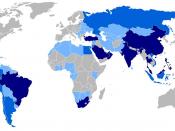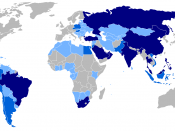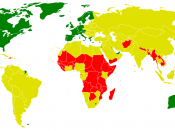Pesticide use around the world allows for farmers to have larger crops, with fewer diseases and pests to reduce crop yields. In developed countries pesticide sprayers have protection from pesticides through protective clothing, and government regulation of pesticides. We also have alternatives to pesticides, through natural resistance techniques such as genetically modified foods. But in third world countries farmers don't have this protection, as farming techniques other than pesticides are expensive, and many people are suffering because of this fact. Pesticide use in third world nations is threatening the health of farmers, and thus should be banned in favour of safer alternatives currently only available in developed countries, such as pheromones, and genetically modified plants. It is the responsiblity of first world nations to provide third world countries with these safer alternatives.
Pesticides are used in third world nations for the same reason that they are used here; to increase plant yields and productions.
The difference is that in developed countries, the government does a good job of protecting sprayers by banning pesticides that are known to be highly dangerous. This does not happen in poorer areas in the world, as in some regions they are so poor that they can't afford any chemicals other than the ones we have banned here, and corporations sell to them as an alternative to discarding them. Another big problem to the health of farmers in developing countries is companies that sell highly toxic pesticides to poor countries, where there are no standards. An example of this are pesticides containing Monocrotophos, which is a dangerous chemical manufactured only in Asia which kills insects, but can cause death very quickly if administered by a farm worker not wearing adequate protective clothing. Fortunately, this pesticide is banned in North America, but is still...


